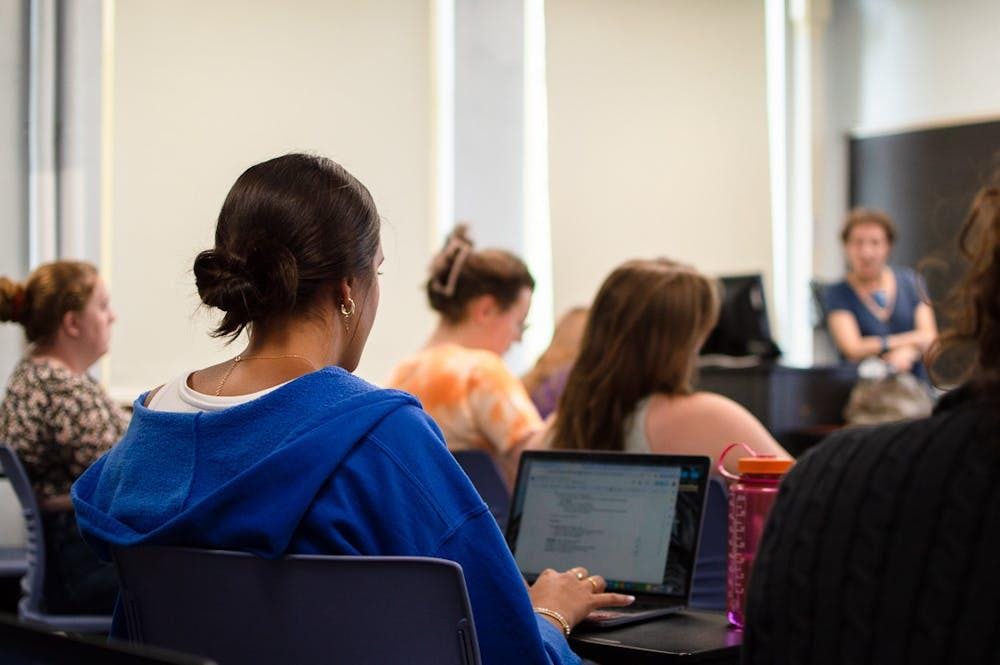I am deeply tired of the lack of participation in classrooms.
Whether it’s a check-in question or a discussion prompt, I can’t tell you the number of times I have watched in awkward horror as my professor or TA is met with a wall of silence.
It makes me uncomfortable, which leads me to raise my hand, which leads me to answer my fifth question in a row, which leads the class (and possibly the professor) to think I’m some unbearable brown-noser who loves the sound of her own voice.
What students don’t seem to realize is that talking in class is a two-fold solution.
For one, the quicker a prompt is answered, the quicker we can all leave. Waiting out the professor actually just takes up more time than answering the softball questions, so just answer. You don’t even have to be right.
Secondly, you might actually get more out of the class if you participate. Not only will the professor know your face, but answering questions and engaging in the class requires you to be somewhat tuned in.
Take for instance, the guy who sits three seats in front of me in my strategic communication class (a group-work based class which is, by the way, silent as a tomb).
Normally, I don’t care what you’re doing, even if it’s watching and subsequently betting on live sports matches like this gentleman. But when you complain about how you’re failing the post-lecture quizzes? Maybe get off FanDuel and lock in.
But I digress.
At a liberal arts institution, I don’t think it’s unreasonable to expect some in-class discussion and participation. In fact, I think it should be enforced.
There are two rules that I believe would foster stronger participation, but they both require giving up something students love: not being called out and internet browsing.
I believe that all classes should be as technology-free as possible and that we should bring back cold-calling.
Enjoy what you're reading?
Signup for our newsletter
First, the technology. I have one class this year that does not allow any electronics within it. No laptops, no phones, no iPads. At first, it was slow, but as students got more comfortable, discussion flourished. We have actual debates, thoughtful responses and even know each other’s names.
It is quicker to take notes on your laptop or iPad, sure. But we’re not in school, paying ridiculous sums of money, to silently browse Zillow as a professor begs someone to confirm that they understand key concepts. If banning laptops and phones solves this, I think it’s a worthy price to pay.
Secondly, we have cold-calling. Faculty, I address you directly.
Students are not talking in class because they know you won’t make them answer.
It may seem cruel, but I think you should start picking students and forcing them to give you something. Even if it’s an “I don’t know, I didn’t do the reading,” the pressure of being called on at any moment will mandate some level of participation.
Students, I know that cold-calling is not popular. I raise you this: if you knew the teacher might call on you for a harder question if you don’t participate, wouldn’t you be more likely to answer the easy one?
Again, I don’t think you need to know everything all the time, or have an eloquent response at the drop of a hat; it’s just not fair when three students are forced to answer again and again because everyone else is willfully ignoring the situation.
The people who need to hear this are unlikely to be reading the paper. But if you’re a faculty person open to suggestions, please consider calling students out at random and taking away our laptops. Maybe it will make your classes more interesting.
And if I know you from any of my classes, I’m sorry. I swear I don’t mean to yap. I just feel like I don’t have a choice.
Parker Green is a sophomore English and strategic communication major whose greatest wish is to add more hours in a day. When she’s not doing school, extracurriculars or tour guiding, she’s usually exploring places to eat and generally being a menace to her friends.




